| Listing 1 - 10 of 18 | << page >> |
Sort by
|
Book
ISBN: 1108100287 1108103081 1316995283 1107189438 1316639126 Year: 2018 Publisher: Cambridge : Cambridge University Press,
Abstract | Keywords | Export | Availability | Bookmark
 Loading...
Loading...Choose an application
- Reference Manager
- EndNote
- RefWorks (Direct export to RefWorks)
It is difficult to imagine forces in the modern world as potent as nationalism and religion. Both provide people with a source of meaning, each has motivated individuals to carry out extraordinary acts of heroism and cruelty, and both serve as the foundation for communal and personal identity. While the subject has received both scholarly and popular attention, this distinctive book is the first comparative study to examine the origins and development of three distinct models: religious nationalism, secular nationalism, and civil-religious nationalism. Using multiple methods, the authors develop a new theoretical framework that can be applied across diverse countries and religious traditions to understand the emergence, development, and stability of different church-state arrangements over time. The work combines public opinion, constitutional, and content analysis of the United States, Israel, India, Greece, Uruguay, and Malaysia, weaving together historical and contemporary illustrations.
Nationalism --- Nationalism and religion --- Religious aspects.
Book
ISBN: 1317087798 131708778X 1472418956 9781472418951 9781472418944 1472418948 9781472418968 1472418964 9781315598185 9781317087779 9781317087786 9781138272019 1315598183 Year: 2014 Publisher: Surrey, England ; Burlington, Vermont : Ashgate,
Abstract | Keywords | Export | Availability | Bookmark
 Loading...
Loading...Choose an application
- Reference Manager
- EndNote
- RefWorks (Direct export to RefWorks)
Demonstrating that in late modernity, parallel to rising nationalisms, there is a shift towards religious communities becoming the central axis for cultural organization and progressive thinking, this book presents Greece as a case study based on empirical field data from contemporary theology and religious education, and makes a unique contribution to ongoing debates about the public role of religion in contemporary Europe.
Nationalism --- Nationalism and religion --- Religious aspects. --- Orthodox Eastern Church --- Doctrines.
Book
Year: 1946 Publisher: London : Gollancz,
Abstract | Keywords | Export | Availability | Bookmark
 Loading...
Loading...Choose an application
- Reference Manager
- EndNote
- RefWorks (Direct export to RefWorks)
Islam. --- Muslims --- Nationalism and religion --- India --- Intellectual life.
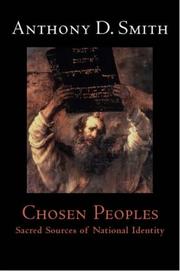
ISBN: 0192100173 9780192100177 Year: 2003 Publisher: Oxford Oxford university press
Abstract | Keywords | Export | Availability | Bookmark
 Loading...
Loading...Choose an application
- Reference Manager
- EndNote
- RefWorks (Direct export to RefWorks)
'Unto thy seed I have given this land.' From the moment of God's covenant with Abraham in the Old Testament, the idea that a people are chosen by God has had a central role in shaping national identity. Chosen Peoples argues powerfully that sacred belief remains central to national identity, even in an increasingly secular, globalized modern world. In this important new study, Anthony D. Smith goes in search of the deep Judeo-Christian roots of the many manifestations of national identity. This rich and timely contribution to current debates about nationalism explains the complex historical reasons behind often violent modern conflicts around issues of land, culture, religion, and politics. Tracing the development of individual nations over many centuries, it offers fascinating insights into the religious and cultural foundations of countries such as Great Britain, the United States, Israel, France, and Germany. The argument draws on a wide range of examples from historic landscapes in Ireland, Switzerland and Egypt, myths of Arthurian Britain, Holy Russia, and Byzantium, through memories of a 'Golden Age', to the modern commemoration of the 'Glorious Dead', and of victims of war.
Covenants --- Election (Theology). --- Messianism, Political. --- Nationalism --- Political messianism. --- Religious aspects. --- Election (Theology) --- Alliances (Religion) --- Election (Théologie) --- Messianisme politique --- Election (Théologie) --- Political messianism --- Messianism, Political --- Messianism --- Nationalism and religion --- Predestination --- Salvation --- Covenants (Religion) --- Religious aspects --- Christianity --- Nationalisme --- Aspect religieux
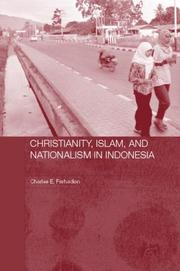
ISBN: 1134240635 1280251913 9786610251919 0203007557 0415359619 0415546699 1134240627 Year: 2005 Publisher: New York , N.Y. : Routledge,
Abstract | Keywords | Export | Availability | Bookmark
 Loading...
Loading...Choose an application
- Reference Manager
- EndNote
- RefWorks (Direct export to RefWorks)
Although over eighty percent of the country is Muslim, Indonesia is marked by an extraordinary diversity in language, ancestry, culture, religion and ways of life. This book focuses on the Christian Dani of West Papua, providing a social and ethnographic history of the most important indigenous population in the troubled province. It presents a fascinating overview of the Dani's conversion to Christianity, examining the social, religious and political uses to which they have put their new religion.Based on independent research carried out over many years among the Dani people,
Christianity --- Islam --- Religion and politics. --- Nationalism --- Religious aspects. --- Nationalism and religion --- Political science --- Politics, Practical --- Politics and religion --- Religion --- Religions --- Mohammedanism --- Muhammadanism --- Muslimism --- Mussulmanism --- Muslims --- Religious aspects --- Political aspects --- west --- papua --- western --- mission --- indonesian --- state --- kenelm --- burridge --- morning --- star
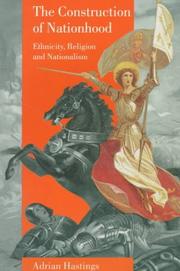
ISBN: 0511612109 0511003765 9780511003769 9780511612107 0521593913 0521625440 9780521593915 9780521625449 Year: 1997 Volume: 1996 Publisher: Cambridge Cambridge University Press
Abstract | Keywords | Export | Availability | Bookmark
 Loading...
Loading...Choose an application
- Reference Manager
- EndNote
- RefWorks (Direct export to RefWorks)
The Construction of Nationhood, first published in 1997, is a thorough re-analysis of both nationalism and nations. In particular it challenges the current 'modernist' orthodoxies of such writers as Eric Hobsbawm, Benedict Anderson and Ernest Gellner, and it offers a systematic critique of Hobsbawm's best-selling Nations and Nationalism since 1780. In opposition to a historiography which limits nations and nationalism to the eighteenth century and after, as an aspect of 'modernisation', Professor Hastings argues for a medieval origin to both, dependent upon biblical religion and the development of vernacular literatures. While theorists of nationhood have paid mostly scant attention to England, the development of the nation-state is seen here as central to the subject, but the analysis is carried forward to embrace many other examples, including Ireland, the South Slavs and modern Africa, before concluding with an overview of the impact of religion, contrasting Islam with Christianity, while evaluating the ability of each to support supra-national political communities.
Nationalism --- Nationalism and religion --- History. --- Religious aspects. --- Hobsbawm, E. J. --- History --- Religious aspects --- Nationalisme --- Histoire --- Aspect religieux --- Europe --- Religious studies --- National movements --- Arts and Humanities --- Nationalism - History. --- Nationalism - Religious aspects.
Book
ISBN: 1108768199 110886113X 1108487866 1108848516 Year: 2021 Publisher: Cambridge : Cambridge University Press,
Abstract | Keywords | Export | Availability | Bookmark
 Loading...
Loading...Choose an application
- Reference Manager
- EndNote
- RefWorks (Direct export to RefWorks)
Over the years, there have been increasing intersections between religious claims and nationalism and their power to frame and govern world politics. When Politics Are Sacralized interdisciplinarily and comparatively examines the fusion between religious claims and nationalism and studies its political manifestations. State and world politics, when determined or framed by nationalism fused with religious claims, can provoke protracted conflict, infuse explicit religious beliefs into politics, and legitimize violence against racialized groups. This volume investigates how, through hegemonic nationalism, states invoke religious claims in domestic and international politics, sacralizing the political. Studying Israel, India, the Palestinian National Movement and Hamas, Sri Lanka, Saudi Arabia, Serbia, Iran, and Northern Ireland, the thirteen chapters engage with the visibility, performativity, role, and political legitimation of religion and nationalism. The authors analyze how and why sacralization affects political behaviors apparent in national and international politics, produces state-sponsored violence, and shapes conflict.
Religion and politics --- Nationalism --- Religious aspects --- Consciousness, National --- Identity, National --- National consciousness --- National identity --- International relations --- Patriotism --- Political science --- Autonomy and independence movements --- Internationalism --- Political messianism --- Politics, Practical --- Politics and religion --- Religion --- Religions --- Political aspects --- Religious aspects. --- Nationalism and religion
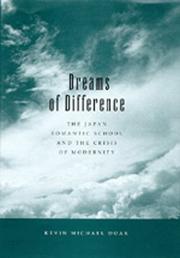
ISBN: 0520083776 9780520083776 Year: 1994 Publisher: Los Angeles University of California press
Abstract | Keywords | Export | Availability | Bookmark
 Loading...
Loading...Choose an application
- Reference Manager
- EndNote
- RefWorks (Direct export to RefWorks)
From 1935 to 1945, the Japan Romantic School (Nihon Romanha), a group of major intellectuals and literary figures, explored issues concerning politics, literature, and nationalism in ways that still influence cultural discourse in Japan today. Kevin Doak's timely study is a broad critique of modernity in early twentieth-century Japan. He uses close readings and translations of texts and poems to suggest that the school's interest in romanticism stemmed from its attempt to surmount the "cultural crisis" of lost traditions. This attempt to overcome modernity eventually reduced the movement's earlier critical impulses to expressions of nationalist longing.
Hinduism --- Islam --- Nationalism --- Religion and politics --- 895.6 --- 895.6 Japanse literatuur --- Japanse literatuur --- Consciousness, National --- Identity, National --- National consciousness --- National identity --- International relations --- Patriotism --- Political science --- Autonomy and independence movements --- Internationalism --- Political messianism --- Nationalism and religion --- Mohammedanism --- Muhammadanism --- Muslimism --- Mussulmanism --- Religions --- Muslims --- Brahmanism --- Social aspects --- Religious aspects --- Religious aspects&delete& --- Romanticism --- Japan --- Intellectual life --- Romanticism - Japan --- Nationalism - Japan --- Japan - Intellectual life - 20th century
Book
ISBN: 9780739192221 0739192221 9781498501880 1498501885 073919223X 9780739192238 9780739192238 Year: 2014 Publisher: Lanham
Abstract | Keywords | Export | Availability | Bookmark
 Loading...
Loading...Choose an application
- Reference Manager
- EndNote
- RefWorks (Direct export to RefWorks)
A scholar of world religions investigates religiously motivated violence that occurred in medieval Tibet and Bhutan, as well as in modern India, Sri Lanka, Burma, and Japan. The fusion of religious and national identity in high lamas and divine kings has caused just as much violence in Asia as it did in Europe and the Middle East.
Violence --- Religion and civil society --- Social conflict --- Nationalism --- #SBIB:316.331H333 --- #SBIB:316.331H383 --- #SBIB:39A10 --- Nationalism and religion --- Civil society and religion --- Civil society --- Violence (in religion, folklore, etc.) --- Religious aspects. --- Godsdienst, oorlog en vrede --- Geografische spreiding van de godsdiensten: Azië --- Antropologie: religie, riten, magie, hekserij --- Moral and religious aspects --- Religious aspects
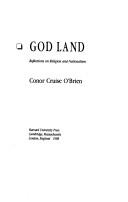
ISBN: 0674355105 Year: 1988 Publisher: Cambridge, Mass. Harvard University Press
Abstract | Keywords | Export | Availability | Bookmark
 Loading...
Loading...Choose an application
- Reference Manager
- EndNote
- RefWorks (Direct export to RefWorks)
Sociology of religion --- Political sociology --- 321.01 --- Nationalism --- -#SBIB:316.331H332 --- #SBIB:321H81 --- Consciousness, National --- Identity, National --- National consciousness --- National identity --- International relations --- Patriotism --- Political science --- Autonomy and independence movements --- Internationalism --- Political messianism --- Algemene staatsleer. Politieke filosofie. Staatsleer. Staatstheorie --- Religious aspects --- Godsdienst en staat --- Westerse politieke en sociale theorieën vanaf de 19e eeuw : nationalisme, corporatisme, fascisme, nationaal socialisme, rechtsextremisme, populisme --- Religious aspects. --- 321.01 Algemene staatsleer. Politieke filosofie. Staatsleer. Staatstheorie --- #SBIB:316.331H332 --- Nationalism and religion
| Listing 1 - 10 of 18 | << page >> |
Sort by
|

 Search
Search Feedback
Feedback About UniCat
About UniCat  Help
Help News
News